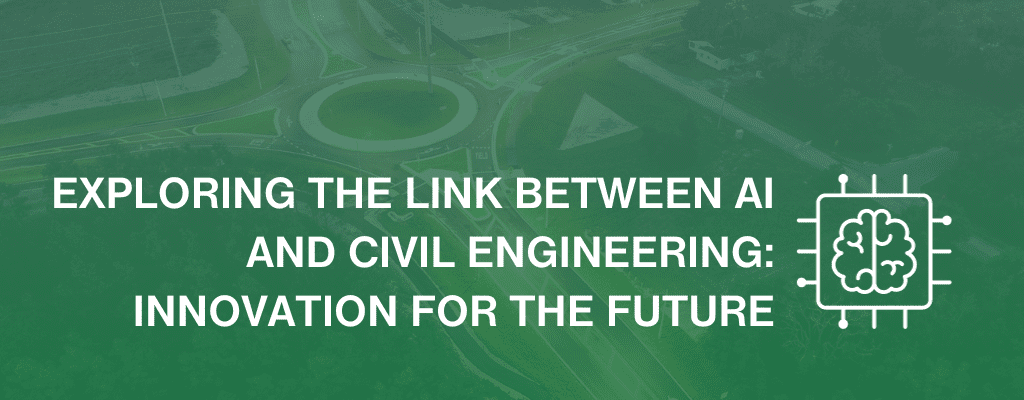
In recent years, the world has witnessed a rapid advancement in Artificial Intelligence (AI) technology and its integration into various industries.
One such field that has seen significant benefits from AI is Civil Engineering. AI-powered solutions are revolutionizing the way civil engineers design, construct, and maintain infrastructure. This article explores the link between AI and Civil Engineering, highlighting how this innovative technology is shaping the future of the industry.
AI in Design and Planning
The use of AI in Civil Engineering has transformed the design and planning phase of infrastructure projects. With the help of machine learning algorithms, engineers can analyze vast amounts of data to make accurate predictions and create optimized designs. AI algorithms can consider various factors such as environmental conditions, terrain, and materials to propose the most efficient and cost-effective solutions.
For example, AI can assist in designing transportation networks by analyzing traffic patterns and suggesting optimal routes. Back in 2010, a team of researchers from Japan and the U.K. fed a slime mold with nutrients arranged to imitate the nodes of the Tokyo subway system. The resulting network was strikingly similar to the real thing and sparked the emergence of what is now known as biologically inspired adaptive network design. A similar study was conducted in Toronto, as represented in the figure below:

points for future improvements (Right)
It can also optimize energy consumption in buildings by analyzing climate data and recommending energy-efficient designs. These AI-powered design tools not only enhance efficiency but also contribute to sustainable development.
AI in Construction and Project Management
Construction projects often face challenges related to delays, cost overruns, and safety concerns. AI technology provides solutions to mitigate these issues and improve project management. Through the use of sensors and machine learning algorithms, AI can monitor construction sites in real time, detect potential risks, and improve safety protocols.

AI can also enhance construction productivity by automating repetitive tasks. For instance, autonomous construction vehicles equipped with AI algorithms can assist in excavation and material transportation, reducing labor-intensive activities. This not only increases efficiency but also minimizes the risk of human error.
AI in Maintenance and Asset Management
Maintaining and managing infrastructure is a critical aspect of Civil Engineering. AI plays a vital role in this domain by enabling predictive maintenance and asset management. By analyzing historical data and real-time sensor readings, AI algorithms can identify potential issues in infrastructure, enabling engineers to take proactive measures before failures occur.
For example, using AI-powered predictive maintenance, engineers can detect early signs of structural deterioration in bridges or buildings, preventing catastrophic failures. Buildots, an AI-driven construction company, is developing an image recognition system that monitors every detail of an ongoing construction project and flags up delays or errors automatically.

Additionally, AI algorithms can optimize asset management by analyzing data on the lifespan, condition, and usage of infrastructure, enabling engineers to make informed decisions regarding repair, replacement, or rehabilitation.
Challenges and Future Opportunities
While the integration of AI in Civil Engineering brings numerous benefits, several challenges need to be addressed. Data privacy, security, and ethical concerns are crucial considerations when implementing AI systems. Additionally, there is a need for skilled professionals who can effectively utilize AI tools and algorithms in Civil Engineering practices.
Looking ahead, the future of AI in Civil Engineering is promising. The ongoing development of AI technologies such as machine learning, deep learning, and computer vision will further enhance the capabilities of AI systems in the industry. Moreover, the integration of AI with other emerging technologies like the Internet of Things (IoT) and robotics will open up new possibilities for innovation and automation.

As we embrace the era of AI, its impact on Civil Engineering cannot be overlooked. The link between AI and Civil Engineering has the potential to revolutionize infrastructure development, making it more efficient, sustainable, and resilient. By leveraging AI-powered solutions in design, construction, and maintenance, Civil Engineers can create smarter, safer, and more sustainable infrastructure for the future. It is essential for the industry to embrace AI and invest in research and development to unlock the full potential of this transformative technology.
Interested in services? Give us a shout! ↓
Sources:
FutureWebAI. (2023, September 21). AI and Predictive Maintenance: Enhancing Asset Performance and Reliability. Medium. https://medium.com/@futureaiweb/ai-and-predictive-maintenance-enhancing-asset-performance-and-reliability-1c25fb400ebc#:~:text=AI%2Ddriven%20predictive%20maintenance%20has,downtime%2C%20and%20optimize%20maintenance%20processes.
Heaven, W. D. (2020, October 21). AI that scans a construction site can spot when things are falling behind. MIT Technology Review. https://www.technologyreview.com/2020/10/16/1010617/ai-image-recognition-construction-computer-vision-costs-delays/
Irving, T. (2022, January 27). Using a “virtual slime mold” to design a subway network less prone to disruption. Phys.org. https://phys.org/news/2022-01-virtual-slime-mold-subway-network.html#:~:text=Back%20in%202010%2C%20a%20team,biologically%20inspired%20adaptive%20network%20design
Rao, S. (2023, March 16). The benefits of AI in construction. 10 Examples of Artificial Intelligence in Construction. https://constructible.trimble.com/construction-industry/the-benefits-of-ai-in-construction
Utilization of Artificial Intelligence (AI) to Monitor Construction Safety. College of Architecture, Design and Construction. (n.d.). https://cadc.auburn.edu/utilization-of-artificial-intelligence-ai-to-monitor-construction-safety/
Share Article
About the Author
Luke Klausner, PE, is a Project Manager at Chastain-Skillman. A graduate of Auburn University’s Civil Engineering Program, Mr. Klausner has seven years of experience in civil engineering, including site development, roadway and utility design, grading and drainage design, stormwater management and detention design, permitting, and construction cost estimation and preparation of contract and technical specifications.
About Chastain-Skillman
CS is a leading engineering firm headquartered in Lakeland, FL, with satellite offices in Orlando, FL, and Nashville, TN. Established in Lakeland in 1950, our company provides Civil Engineering, Water/Wastewater Engineering, Land Surveying, Geology/Hydrogeology, and Construction Management/Inspection services.
At CS, we treasure our role in creating thriving communities, always respecting the impact our work has on their foundations and their futures. For more information, visit chastainskillman.com.

